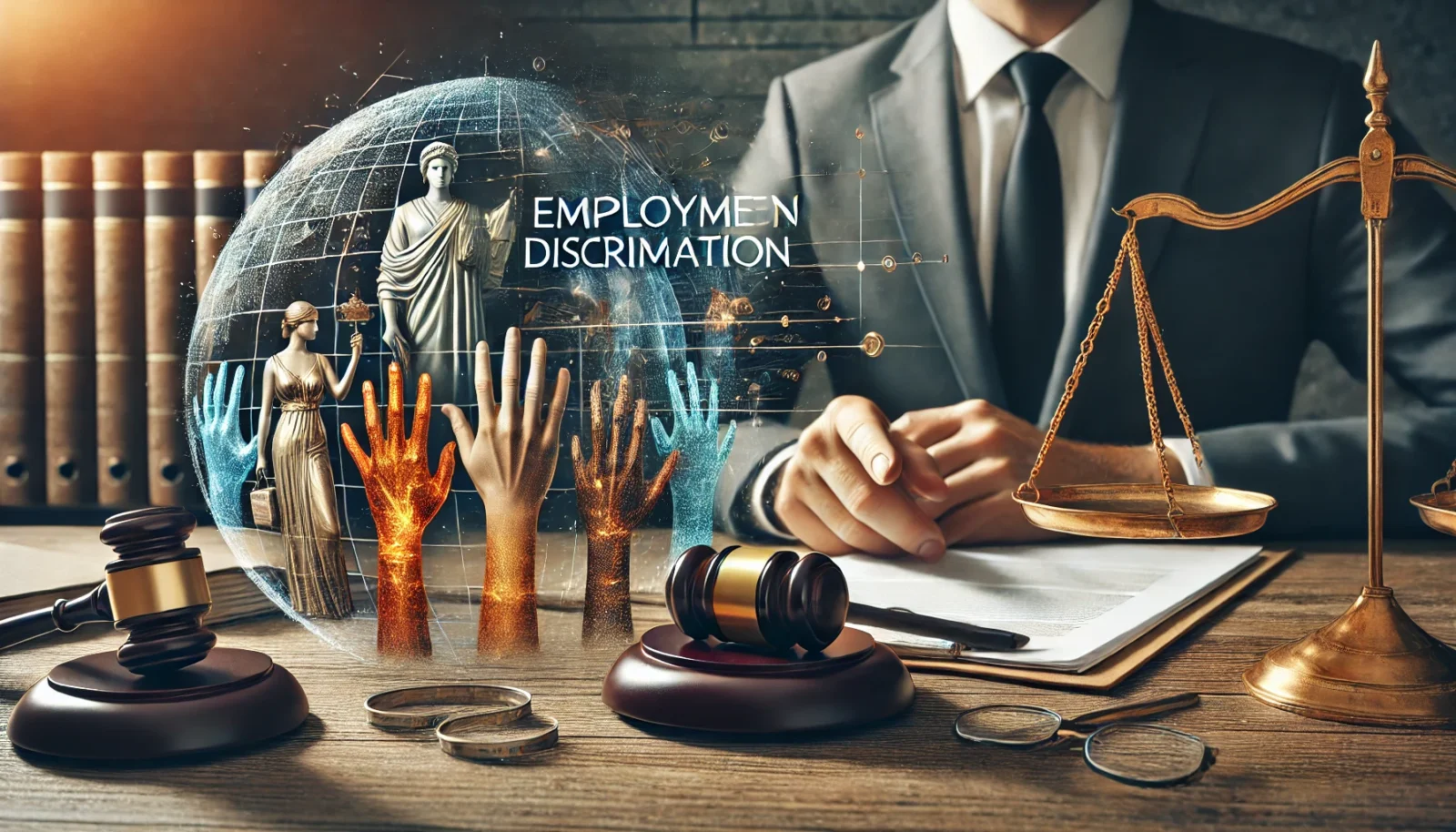Introduction To Employment Discrimination
Definition Of Employment Discrimination
Employment discrimination happens when an employer treats a worker unfairly because of who they are. This unfair treatment can be based on race, gender, age, disability, religion, or other personal characteristics. It’s not about how well someone does their job; it’s about bias and prejudice. Discrimination in the workplace creates an unfair and unequal environment where some people are favored while others are mistreated.
Common Types Of Discrimination
1. Race Discrimination: This occurs when a worker is treated poorly because of their race or the color of their skin. It can show up in hiring, promotions, pay, or day-to-day treatment at work.
2. Gender Discrimination: This is when someone is treated unfairly because of their gender. Women often face this, such as being paid less than men for the same work or being passed over for promotions.
3. Age Discrimination: Older workers may be targeted for unfair treatment simply because of their age. This can include being denied a job, promotion, or even being forced out of a job early.
4. Disability Discrimination: Workers with disabilities may face barriers at work, whether through lack of accommodations or outright bias. This discrimination prevents them from performing their job or getting hired in the first place.
Importance Of Addressing Discrimination In The Workplace
Addressing discrimination is vital for creating a fair and equal workplace. It ensures that everyone, no matter who they are, has the same opportunities to succeed. When discrimination is left unchecked, it creates a toxic work environment. This not only harms those directly affected but also damages the overall morale of a company. Addressing discrimination is about protecting the rights of all workers and ensuring that everyone is treated with respect and dignity.
Role Of An Employment Discrimination Attorney
Overview Of What An Employment Discrimination Attorney Does
An employment discrimination attorney is a legal expert who helps workers facing unfair treatment at their jobs. These attorneys understand the laws that protect employees from discrimination. They work to ensure that their clients’ rights are respected and that they receive fair treatment. When someone feels they have been discriminated against at work, an employment discrimination attorney is there to guide them through the legal process.
Key Responsibilities
1. Advising Clients: The first step an attorney takes is to listen to the client’s story. They help the client understand whether the treatment they experienced is considered discrimination under the law. The attorney provides clear advice on the best course of action.
2. Filing Complaints: If the attorney believes that the client has a strong case, they help file a formal complaint. This could be with the employer, the Equal Employment Opportunity Commission (EEOC), or in court. Submitting a complaint is a vital move in pursuing justice.
3. Representing Clients in Court: If the case goes to court, the attorney represents the client. They prepare all necessary legal documents, present evidence, and argue the case before a judge or jury. Their goal is to prove that discrimination occurred and to secure compensation or other remedies for the client.
Importance Of Hiring An Experienced Attorney In Discrimination Cases
Hiring an experienced employment discrimination attorney is essential. Discrimination cases can be complex and challenging to prove. An attorney with experience knows how to gather the right evidence, build a strong case, and navigate the legal system effectively. They understand the strategies that employers might use to defend themselves and are prepared to counter those tactics. With an experienced attorney, the chances of achieving a favorable outcome increase significantly. They ensure that the client’s rights are fully protected and that justice is served.
Common Types Of Employment Discrimination Cases
Racial Discrimination:
Racial discrimination happens when an employee is treated unfairly because of their race or ethnicity. This can include being passed over for promotions, receiving lower pay, or facing harassment at work. For example, a qualified worker might be overlooked for a job because of their race, or they might be subjected to racist comments from coworkers.
When racial discrimination occurs, employees have legal options. They can file a complaint with the Equal Employment Opportunity Commission (EEOC) or take the case to court. The law is on the side of the employee, and an employment discrimination attorney can help pursue justice.
Gender Discrimination:
Gender discrimination occurs when individuals face unfair treatment based on their gender. This often affects women, but men can be victims too. Common examples include wage gaps, where women are paid less than men for doing the same job. Sexual harassment is another form of gender discrimination, where unwanted advances or inappropriate behavior make the workplace hostile.
Victims of gender discrimination can seek legal recourse. The law requires that men and women be treated equally in the workplace. An attorney can help file a complaint, negotiate settlements, or take the case to court if necessary.
Age Discrimination:
Age discrimination targets older workers, usually those over 40. They may be denied jobs, promotions, or training opportunities simply because of their age. Some companies might also try to push older workers into early retirement. This unfair treatment is often based on stereotypes that older workers are less capable or unwilling to adapt.
Legal safeguards exist to protect individuals from age discrimination. The Age Discrimination in Employment Act (ADEA) helps protect workers over 40. An employment discrimination attorney can assist in filing a complaint and seeking justice for unfair treatment based on age.
Disability Discrimination:
Disability discrimination occurs when an employee with a disability is treated unfairly or denied reasonable accommodations. For example, a worker who needs a modified work schedule due to a disability might be refused this accommodation, or they might face bias from coworkers or supervisors.
The Americans with Disabilities Act (ADA) safeguards the rights of workers with disabilities. This law requires employers to provide reasonable accommodations and prevents them from discriminating against employees with disabilities. If an employer fails to comply, an attorney can help the employee take legal action.
Religious Discrimination:
Religious discrimination occurs when an employee faces unfair treatment due to their religious beliefs or practices. This can include being denied time off for religious holidays, being forced to participate in activities that go against their beliefs, or facing harassment for their religion.
Employees are protected by law from religious discrimination. Employers are required to provide reasonable accommodations for religious practices, unless doing so would result in undue hardship. An attorney can help workers ensure their rights are respected and take action if they are not.
How To Identify Employment Discrimination
Signs Of Discrimination In The Workplace
Employment discrimination can take many forms. You may notice that certain coworkers receive better opportunities, more favorable treatment, or higher pay despite similar qualifications. Discrimination can happen in hiring, promotions, job assignments, or even in how rules are enforced. If you see that someone is treated differently because of their race, gender, age, religion, or disability, this could be a sign of discrimination. Unfair comments, offensive jokes, or exclusion from meetings or projects are also warning signs.
How To Document Incidents Effectively
When you suspect discrimination, start documenting everything. Write down what happened, who was involved, and when it took place. Keep emails, texts, and other communications that show unfair treatment. Make sure your notes are clear and detailed, as this will help if you decide to take action later. If you witness discrimination against others, note that as well. Thorough documentation can be the key factor in determining the outcome of a case.
Importance Of Acting Promptly
It’s important to act quickly if you believe you are facing discrimination. Delaying action can make it more challenging to establish your case effectively. Reporting the issue to HR or your supervisor as soon as possible is a good first step. If the problem isn’t resolved, you may need to consult with an employment discrimination attorney. Acting promptly ensures your rights are protected and increases the chances of a positive outcome.
Legal Framework Surrounding Employment Discrimination
Overview Of Key Laws
Several important laws protect employees from discrimination. One of the most significant is Title VII of the Civil Rights Act. This law bars employers from discriminating based on race, color, religion, sex, or national origin. Another key law is the Americans with Disabilities Act (ADA). The ADA ensures that people with disabilities are treated fairly in the workplace and have access to the same opportunities as others. The Age Discrimination in Employment Act (ADEA) is also essential. It protects workers aged 40 and older from being discriminated against because of their age.
Role Of The Equal Employment Opportunity Commission (Eeoc)
The Equal Employment Opportunity Commission (EEOC) is the federal agency designated to enforce these laws. If an employee feels they have been discriminated against, they can file a complaint with the EEOC. The EEOC investigates the claim and can take action against the employer if they find evidence of discrimination. The EEOC also provides guidance to employers and employees on how to prevent discrimination in the workplace.
How These Laws Protect Employees
These laws are designed to ensure that all employees have a fair chance to succeed at work, regardless of their race, gender, age, disability, or other protected characteristics. They prevent employers from making decisions based on bias or prejudice. If an employer violates these laws, they can face legal consequences, including fines and lawsuits. Employees who face discrimination can seek justice through these laws, often with the help of an employment discrimination attorney.
Steps To Take If You Experience Discrimination
How To File A Complaint With The Eeoc
If you believe you’ve been discriminated against at work, one of the first steps is to file a complaint with the Equal Employment Opportunity Commission (EEOC). This process starts by contacting the EEOC office, either in person, by phone, or online. They will ask you for details about what happened and may request documents or other evidence. It’s important to file your complaint as soon as possible because there are time limits. After you file, the EEOC will investigate your claim to see if there is enough evidence to take action.
Internal Company Procedures And Policies
Before contacting the EEOC, it’s often a good idea to follow your company’s internal procedures. Many companies have policies in place to deal with discrimination complaints. This could involve reporting the issue to your HR department or a designated manager. They may conduct their own investigation and try to resolve the issue internally. Following these steps shows that you have given the company a chance to correct the problem, which can be important if the issue escalates.
Consulting With An Employment Discrimination Attorney
If you’re not sure what to do, or if your complaint isn’t being taken seriously, consulting with an employment discrimination attorney can be a smart move. An attorney can help you understand your rights and guide you through the process, whether it’s dealing with your company or filing a complaint with the EEOC. They can also offer legal representation in court if necessary. Having an attorney on your side can make a big difference in ensuring your case is handled properly and that you get the justice you deserve.
Why You Need An Employment Discrimination Attorney
Benefits Of Legal Representation
Hiring an employment discrimination attorney can be highly beneficial. They have the expertise and experience needed to navigate complex legal issues. An attorney can help you understand your rights and options, making sure you don’t miss any important deadlines or steps. They can also negotiate on your behalf and work to get you the best possible outcome. Legal representation can provide peace of mind, knowing that you have a professional who is dedicated to protecting your interests.
How An Attorney Can Strengthen Your Case
An attorney can significantly strengthen your case by helping to gather and present evidence. They know how to collect and organize documents, witness statements, and other important information that supports your claim. An attorney can also help you identify and address any weaknesses in your case. Their experience with similar cases allows them to craft a strong argument and anticipate challenges that may arise. This expertise can greatly influence the outcome of your case.
What To Expect During The Legal Process
The legal process for employment discrimination cases can be detailed and time-consuming. Initially, your attorney will help you file a formal complaint and begin the investigation. They will communicate with the EEOC or other relevant agencies and keep you updated on any developments. If your case goes to court, your attorney will represent you during hearings and trials, presenting evidence and arguing your case. Throughout the process, you can expect regular updates and guidance from your attorney, helping you understand each step and make informed decisions.
Choosing The Right Employment Discrimination Attorney
Factors To Consider When Selecting An Attorney
Selecting the right attorney for your employment discrimination case is vital. First, look for an attorney with a good reputation. Check reviews and ask for recommendations from trusted sources. Consider their communication skills and how comfortable you feel discussing your case with them. Availability is also important; make sure they can give your case the attention it needs.
Importance Of Experience And Specialization
Experience and specialization are key when selecting an attorney. An attorney who focuses on employment discrimination law will have a deeper understanding of the nuances and complexities of these cases. They will be familiar with relevant laws, court procedures, and strategies that are most effective. An experienced attorney is more likely to handle your case efficiently and effectively.
Case Studies Or Success Stories
Examples Of Successful Employment Discrimination Cases
There have been many successful employment discrimination cases that highlight the importance of legal action. For example, in one notable case, an employee was discriminated against based on their gender. The attorney was able to prove that the company had a pattern of gender bias in promotions. As a result, the employee received a significant settlement and the company was required to change its policies. Another case involved age discrimination, where an older worker was unfairly passed over for a promotion. The attorney demonstrated that the company’s decision was based on age rather than performance. The employee was awarded compensation, and the company had to revise its promotion practices.
Lessons Learned From Real-life Cases
Real-life cases teach several important lessons. First, documentation is crucial. In both cases, having clear records and evidence was key to proving the claims. Second, acting quickly can make a difference. Delays can weaken a case, so it’s important to take action as soon as possible. Finally, having a knowledgeable attorney can greatly impact the outcome. Experienced attorneys can navigate complex legal systems, present strong arguments, and negotiate effectively.
Impact Of Having A Skilled Attorney
A skilled attorney can significantly influence the success of a discrimination case. They understand the legal framework, know how to gather and present evidence, and can craft a persuasive argument. Their expertise helps in anticipating and overcoming challenges. For example, in the cases mentioned, the attorneys used their experience to build a strong case, which led to favorable outcomes for their clients. Their skill in negotiation and representation often results in better settlements and resolutions. Having a dedicated and experienced attorney can be the key to achieving justice and holding employers accountable for discrimination.
Cost Of Hiring An Employment Discrimination Attorney
Typical Fee Structures
When hiring an employment discrimination attorney, it’s important to understand the different fee structures. Many attorneys operate on a contingency fee basis, meaning they receive payment only if you win the case or secure a settlement. Their fee is usually a percentage of the amount awarded. This can make it easier to afford legal help since you don’t have to pay upfront. Other attorneys may charge hourly rates. With this arrangement, you pay for the time they spend working on your case, regardless of the outcome. Hourly rates can vary significantly depending on the attorney’s experience and geographic location.
Understanding The Costs Involved
In addition to attorney fees, there might be other costs involved in pursuing a discrimination case. These can include filing fees, costs for obtaining records, expert witness fees, and charges for copying and mailing documents. It’s a good idea to discuss these potential costs with your attorney upfront to avoid surprises. They should provide a clear breakdown of what expenses you might expect and how they will be handled.
How Some Attorneys Offer Free Consultations
Many employment discrimination attorneys offer free initial consultations. This allows you to discuss your case and get a sense of whether the attorney is a good fit for you without any financial commitment. During this consultation, the attorney can provide an overview of your legal options, discuss potential outcomes, and explain their fee structure. This free consultation can help you make an informed decision about whether to proceed with legal action and which attorney to hire.
How Employment Discrimination Attorneys Work With Employers
Role Of Attorneys In Advising Companies To Prevent Discrimination
Employment discrimination attorneys play a key role in advising companies on how to avoid discrimination issues. They help businesses understand and comply with employment laws. This includes reviewing company policies and practices to ensure they are fair and non-discriminatory. Attorneys may also advise on creating inclusive job descriptions and recruitment processes. Their goal is to help companies build a positive work environment and prevent legal problems related to discrimination.
Training And Compliance Programs
Attorneys often assist companies in developing and implementing training programs for employees and management. These programs focus on educating staff about discrimination laws, recognizing discriminatory behavior, and understanding the company’s policies. Training helps prevent discrimination by raising awareness and promoting a respectful workplace. Attorneys also help companies with compliance programs to ensure ongoing adherence to legal standards. This includes regular audits and updates to company policies as laws and regulations change.
Mediation And Dispute Resolution Services
When disputes arise, attorneys can offer mediation and dispute resolution services. Mediation is a process where an attorney helps facilitate a conversation between the employer and the employee to resolve the issue without going to court. This can be a quicker and less costly way to address complaints. Attorneys may also help with other forms of dispute resolution, such as arbitration, where a neutral third party makes a binding decision on the matter. These services aim to resolve conflicts in a fair and efficient manner, benefiting both parties and reducing the risk of prolonged litigation.
Conclusion
Addressing employment discrimination is crucial for ensuring a fair and equitable workplace. Discrimination not only harms individuals but also undermines the integrity and productivity of organizations. It’s important to recognize and act against unfair treatment to protect your rights and promote a positive work environment.
Legal support plays a vital role in navigating the complexities of discrimination cases. An experienced employment discrimination attorney can provide valuable guidance, help you understand your rights, and increase the likelihood of a favorable outcome. Their expertise is essential in gathering evidence, negotiating settlements, and, if necessary, representing you in court.
If you believe you are facing discrimination at work, don’t hesitate to take action. Document the incidents, report them through the proper channels, and seek legal advice to explore your options. Taking these steps can help address the issue effectively and ensure that your rights are upheld.
Frequently Asked Questions (FAQs)
What Is Employment Discrimination?
Employment discrimination happens when an employer treats someone unfairly due to their race, gender, age, disability, religion, or other protected characteristics. This can occur in hiring, promotions, job assignments, or other job-related actions.
What Should I Do If I Believe I’ve Been Discriminated Against?
Document all incidents of discrimination, report the issue to your HR department or supervisor, and consider filing a complaint with the Equal Employment Opportunity Commission (EEOC). Consulting with an employment discrimination attorney can also help.
How Long Do I Have To File A Complaint?
You typically have 180 days from the date of the alleged discrimination to file a complaint with the EEOC. This period can sometimes be extended.
Can I Sue My Employer For Discrimination?
Yes, if you have evidence that your employer discriminated against you based on protected characteristics, you may be able to sue. Consulting with an attorney can help you understand your options.
What Kind Of Compensation Can I Receive?
Compensation can include back pay, front pay, emotional distress damages, and possibly punitive damages, depending on the specifics of your case.
Do I Need A Lawyer To File A Complaint With The Eeoc?
No, you can file a complaint on your own, but having a lawyer can be beneficial. They can guide you through the process and help strengthen your case.
Can I Be Fired For Filing A Discrimination Complaint?
It is illegal for an employer to retaliate against you for filing a complaint. If you experience retaliation, you should report it and seek legal advice.
Does Employment Discrimination Only Involve Obvious Cases?
No, discrimination can be subtle, such as biased performance reviews or exclusion from opportunities. Documenting and addressing these issues with legal help is important.
To read more, visit our blog page. We do have more topics!














Got a Questions?
Find us on Socials or Contact us and we’ll get back to you as soon as possible.